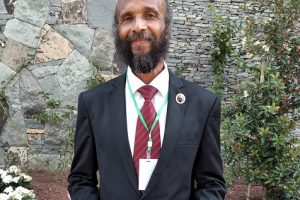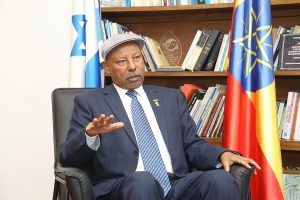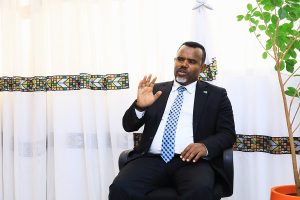
BY ZEKARIAS WOLDEMARIAM
Part II
In the first part of this interview published last week, Roccatello had elaborated on the overall issue of TJ, why Ethiopia needs it, possible challenges on the implementation of TJ and how Ethiopia should tackle them, among others. In this part she dwells at length on topics related to truth in the case of TJ, authenticating the truth as told by both victims and alleged perpetrators of crimes or violation of human rights, the role of institutional reform, elders and religious leaders. Have a nice read!
In TJ, how is truth understood? What does it entail?
The right to truth is a right of victims who suffered human rights violations to know exactly what has happened to them or to their family members, if their family members didn’t survive. And, the truth is the truth of those whose rights have been violated. This concept of truth is based on the premise that those who suffer violations are not in the same position to express their views and their truth. The truth that is generally known and accepted in a violent society is the truth of the powerful, those who are in a position to commit human rights violations, and those who must justify those human rights violations somehow.
Normally, they justify them [by claiming] the group that suffers human rights violation is outside the law, that they have re-vindications that would undermine the existence of the state, or that they are inherently violent, or that they are less, or that they traditionally do not have a right to certain part of state resources.
You need to justify, you need to create a doctrine that justifies violent behavior. Consequently, a core pillar of transitional justice is truth; and it materializes by creating the space for victims to safely present their experience, and, through this, recreate a truth that challenges the truth of the powerful and rebalance the different views. The truth that you seek in transitional justice is not the “absolute truth.” It is just a way to provide those who have been at the receiving end of atrocious acts the dignity to say “we as citizens have suffered, and you the state or the other group that has inflicted violence must recognize that what you did was wrong”
This process involves as much the victims as the other parts of the society that have participated in committing violence, because it’s a process of reckoning. Through it, you hopefully arrive at a shared truth, not the absolute truth. Nobody has the absolute truth. All views and positions are equally important and deserve respect. But for somebody or a group who has been victimized in such a manner, they will
never find in the same paradigm the space and opportunity to make their views and their experience known. And regardless of the reasons why [those responsible] have victimized, when you commit a gross violation of human rights it is wrong and it has to be acknowledged and remedied.
Does it mean truth seeking aims to give victims a chance to voice their grievances rather than find culprits to hold accountable?
Exactly, the grievances! But there are a variety of ways to develop a truth-seeking exercise. There are truth commissions, there are commissions of inquiry. There are civil society initiatives where victims come forward publicly and or privately to tell their stories and, on the basis of their stories, a report or a document is created that forms the basis for negotiating a reckoning with those who have perpetrated human rights violations. So, you have a variety of options. You can have a public hearing; you can take only private statements; you can have a sample of victims, who have the most emblematic human rights violations that occurred in a context, or you may go for a full interview and the inclusion of all victims; you can target one particular period or you can target a particular violent phenomenon. So, the sky’s the limit. It is for each society to find its own way to start the process of thinking about what has gone wrong and how we can change. And that process need to be based on the voices and experiences of those who had no voice—those who were victimized.
What about the alleged perpetrators of violence or violations of human rights? How are they involved in TJ?
In order for the truth-seeking exercise to be successful, for it to be a complementary accountability measure, it needs to be very well thought out. There are countries that have opted to put victims in front of the perpetrators as part of a truth-seeking exercise. That is an option. It is dangerous, because, of course, on one hand, you may re-traumatize the victims who are facing their own torturers or who may find it very difficult to speak up.
You may, on the other hand, ostracize and stigmatize the perpetrators, which even if you may think they ought to be punished and they deserve it, nevertheless, they are individuals who will continue to have a role in the society. And through this reckoning process, you offer them a possibility to acknowledge what they did and to continue be an active part in an overall peaceful society by becoming agents of change. At the end of the day, they retain the most valuable experience of how, in a society, certain individuals in an official position can turn or be turned into violators.
And they also have a story to tell—for example, the young soldier who finds himself in a community that is totally hostile and needs to defend himself and, by doing so, commits violations and kills civilians. If you want to include perpetrators in a truth commission, you need to care for them as much as you care for victims.
You need to prepare them. You need to understand, for example, if they are military personnel, how much the army accepts and is prepared to face the recounting of a such serious crimes committed by their staff. There are institutional consequences. So, it’s a very long and careful process where you really need to prepare the individuals to come before each other and start talking to each other on a different level, without fear, with great humility, but also with the intention to come out differently.
Does it mean bringing perpetrators into a TJ process is an option, rather than an obligation?
Yes, it is an option. I mean, South Africa did that, for example; The Gambia did that more recently. But even it needs to be told that, for example, in The Gambia, the truth commission has adopted a very accusatory type of process, with which, to be honest with you, I was not entirely comfortable. In Colombia, on the other hand, you have a much more developed process where you still have some hearings, where some of the perpetrators come and meet the victims. But the truth commission was not only about that. The truth commission gathered all the stories and experiences of the victims. And once they [the commissioners] identified some specific incidents of violations that were of particular importance, then they pursued the possibility to bring some perpetrators together with the victims to reconcile. But it was very carefully done, very well prepared. What is very important is that it’s not the only option. The reason why you favor the victims in a truth commission or the truth-seeking exercise is because they never have a chance to tell what happened to them.
What do you think should be done to avoid the possibility of abuse during a truth-seeking process?”
That is always a risk. A full transition requires cultural endorsement. You can take all the possible measures to protect the victims, to prepare the perpetrators, to foster the political will to allow perpetrators to come clean and acknowledge what they did.
But, of course, there will be always those who oppose, who have different views. Looking at Colombia, after the signature of the peace accord and the implementation of the peace agreement with all the institutions of transitional justice, in six months, 146 political activists and opponents were killed, and we were already at “peace.” So, it’s a risk because transition takes time. No society is devoid of violence. But you can responsibly-and the state retains that responsibility-put in place measures and systems so that the stakeholders, those who participate in the process, are protected.
Furthermore, the results shouldn’t be the report only; it shouldn’t be just the document. The process itself should evolve to educate society at large that there is not a single truth and that the problems lie much deeper. Therefore, if we want to coexist in one way or another, we need to take into consideration the experiences of everyone and have respect for the victims and allow the perpetrators, even those who have committed the most atrocious acts, through a process of acknowledgment where they actively participate in repairing the victims and make themselves models for a different way of governing. Then, they can regain trust and legitimacy vis-à-vis the public.
How do we measure the authenticity of truth or victims’ accounts in a TJ process?
The process of truth seeking is not evidence based. It’s not a judicial proceeding, where the truth is only determined by admissible evidence. A truth-seeking exercise is the beauty of providing victims a dignified space to confront perpetrators and society at large, a chance to confront what happened to them. Regardless of the reasons why it happened, it is wrong in nature. Many truth commissions have opted to provide that space to a number of victims and then select those cases that, because of the nature of the violations or the political significance of the incident, warrant a criminal prosecution.
All the others were captured in the report and/or the documentation that came out of the exercise and formed the basis to try and identify the new institutional and political structure of the country that would prevent those violations from occurring again and allow for an effective accountability process—an accountability that is both vertical for citizens via state institutions and horizontal for state institutions vis-à-vis other state institutions.
How can you ensure the account of a perpetrator is genuine?
The ultimate goal of a truth commission is not to prosecute. Of course, there is a certain degree of corroboration that you need to do, because otherwise if you expose individuals who just lie, those can be the spoilers right at the start of the transition. Those testimonies, if given credit, can delegitimize the entire process. But the corroboration, the investigation you do in a truth commission, is very different than the investigation that is required to determine the guilt or the criminal responsibility of an individual beyond reasonable doubt. It’s very different; the processes have completely different goals.
What kind of role should traditional elders play in implementing TJ?
In my view, they are of extreme importance because their influence in the society and their potential to foster peace and peaceful coexistence are paramount. You can barely have a meaningful process, if the most influential individuals, whether they are state politicians or community or religious leaders, do not endorse and participate. There are risks involved with those leaders because very often traditional and religious groups have views that are not always compatible with human rights.
There are certain traditional as well as religious structures that do not necessarily contest inequality, that do not necessarily challenge gender discrimination, for example. So, it’s important that these leaders are involved, that they understand exactly what is at stake. But, it’s not for sure that you will be able to involve them all. There are always champions of peace and champions of reforms in every group, and you need to leverage those and leverage their influence among their own constituencies to accompany in the process.
How great is the need for institutional reform to ensure TJ? What does it include?
Institutional reform is the widest possible aspect of transitional justice. It may mean legislative reforms if you have a criminal code, for example, that is particularly repressive or that doesn’t include criminalization of certain acts like torture, extrajudicial killing, enforced disappearance, or sexual violence. Then, you need to reform your criminal code. That is institutional reform. If you have a law enforcement that doesn’t act according to rule of law principles and arrests without the judicial control, that puts people in prison or in detention indefinitely, if you use this excessive force without accountability, then you need to reform the law enforcement and you may need to change the personnel, the individuals who are part of that law enforcement or the military, or equally the officials or the public servants.
In Greece, at the end of the military junta, when the country opted to become a democratic state, one of the main groups of public officials that was targeted by institutional reforms were teachers, because Greek society at that point felt that teachers at all levels, including, of course, higher education or the university, were the main promoters and supporters of the military doctrine. And so, they were completely changed. In Georgia, at some point, the president decided one day after the other to dismiss, to fire traffic police. And Georgia remained without police officers for three months.
These are all extreme measures. And by the way, they were done in a way that is not very democratic and it posed a lot of problems. If you decide to go out and remove some individuals from institutions, you need to go through an accountable process. It’s not a good idea just to fire the entire category.
There are many other examples, like in Kenya, where different components and units of the police were scrutinized in phases. Each individual was put under scrutiny to decide whether this individual was fit to continue serving in a democratic Kenya. Ethiopia like any other state needs to find its own solution. And more importantly, even if everything is required, which is often the situation, it will be impossible to do everything at once.
So, you need to start from somewhere and then decide, depending on the energy of society, economic resources, and political will, what you can tackle now, what you can tackle in three months, or what will be possible in five years. As an example of transitional justice, in South Africa, with the most famous truth commission in history, the real political transition occurred with the revision of the constitution. That process was parallel to the truth commission, and even began before its establishment.
So, everything is important, everything is in principle necessary, but what you will be able to do and when and how depends on the conditions. As long as this process continues, as long as there is a genuine commitment to care for those who have suffered and to change, then it will continue slowly, sometimes more rapidly depending on what is possible.
ICTJ has been documenting the experiences learned in years of applying TJ in various countries. Could you tell us the best lessons learned so far?
The lessons learned from experience are too numerous to describe here, but I can give you the highlights. The highlights are that transitions are long-term processes; some political will is required for change; you need an active, educated but also inclusive civil society; you must have certain degree of understanding that, despite the differences (ethnic, religious and geographic), we are united in pursuing justice for certain values; you need resources, of course; and more importantly, there is no society that has finished its transition to democracy. And if you don’t like the term democracy, an inclusive, transparent, accountable, and equitable society is a continuous process that will always need to be careful and vigilant vis-à-vis liberties, the protection of freedom, and the activation of the remedies to counter violations of rights. So, the experiences are very different. But at the end of the day, it’s really the resilience of the victims and the need to provide justice to those who have suffered that are most important, because no society can survive such injustice and inequity in the medium or long term.
Thank you very much for allowing me your precious time for the interview!
Thank you, too!
THE ETHIOPIAN HERALD SATURDAY 6 MAY 2023





